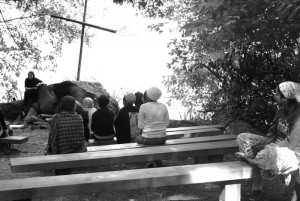
The Discipleship
“The title ‘Sikh’, ‘The Disciple’, was first given to us by Guru Nanak.We were mere corpses, he poured life into us. We were thus created anew by His love of us. He made us alive with our out-drawn love of Him and left us free. He freed us from the hatred of caste, colour and creed. He made us look straight at the sky towards the Infinite, he made us look upon the sun and the moon and the stars as our kith and kin. He did knit us with the Universe and he wove the design of the Infinite into the texture of our soul. He gave us then the universal music to sing; birds and animals to be our confidants, woods and rivers and hills to sing with us. This world that sat like a nightmare on us was thrown away: the new world was laid open before our eyes in His Vision…
…by the title ‘Sikh’, he linked us with Himself forever.” The Spirit Born People, Professor Puran Singh p.9
Gurmukh pyare, Professor Puran Singh reminds us in his characteristic, intense, fierce, and passionate manner that Guru Nanak never preached:

“ …but only planted with his own hand the seedling of spiritual life in the soul of the disciple and watched it grow as a gardner watched palnts…The Guru sat in the heart of the disciple, sonsuming all sensual desire and leading the disciple, into perfect godhead. And whenthe disciple into perfect godhead. And when the disciple heard the voice of the Guru within himself he caught it and went on, merely eching and re- eching the music of the MAster’s Nam. The Ten Masters, Professor Puran Singh, p106
The disciple is in search for a master, of a place where she can reveal everything without any fear, without any resistance, the master is in search of a disciple who is willing to empty or reveal him/herself to her. When the two meet, the resulting relationship is very unique. Most relationships are conditional but the one that exists between the master and the disciple is totally unconditional (at least in the beginning from the master’s side). The disciple may have initial doubts but the realized master, a divine instrument is the embodiment of love, is ever forgiving, ever loving, and ever present. Continue reading →












